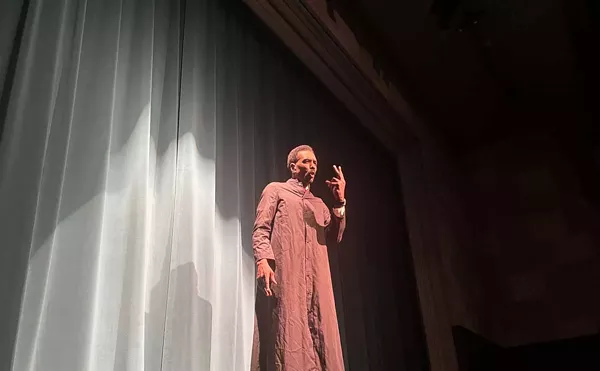
Audio By Carbonatix
[
{
"name": "GPT - Leaderboard - Inline - Content",
"component": "35519556",
"insertPoint": "5th",
"startingPoint": "3",
"requiredCountToDisplay": "3",
"maxInsertions": 100,
"adList": [
{
"adPreset": "LeaderboardInline"
}
]
}
]
Perfectly respectable. It’s not the kind of praise that sends audiences dashing to the theater, but there you have it. Except for its awful title, Ladies in Lavender is a perfectly respectable film where very little happens, but it’s done very well.
Ursula and Janet Widdington (Judi Dench and Maggie Smith) are a pair of spinster sisters enjoying their sunset years in 1930s Cornwall, an idyllic coastal town where the house servants are lovingly disgruntled and the local fishermen clap each other on the back in warm camaraderie. The night after a terrible storm, the sisters find a young Polish man named Andrea (Daniel Brühl) washed ashore. While nursing him back to health, they are delighted to discover he’s a gifted violinist. Furthermore, this boyishly handsome houseguest awakens very different feelings in the two women. The older and ever practical Janet is surprised to find her maternal instincts kicking in after so many childless years. Wistful Ursula, on the other hand, starts to nurse an adolescent crush fueled by a lifetime of unfulfilled romantic longings.
It’s inevitable in stories like these that the villagers, unused to visitors, harbor suspicions and jealousies; especially when Andrea develops a relationship with an attractive German painter (Natascha McElhone). What’s surprising, however, is what little drama this situation generates. There are no secrets or unexpected twists to the story, and Andrea eventually wins the affection of nearly everyone in town. To say that the film is low-key would be an understatement.
Because esteemed actor Charles Dance’s directorial debut is filled with so many tasteful and expertly acted moments, one is inclined to overlook the film’s complete lack of dramatic thrust. Ladies in Lavender instead finds its strength through sensitively portrayed characters and a melancholic mood. Dance masterfully teases out a poignant sense of time and place that feels both authentic and lyrical. The beautiful cinematography and score are lovely complements to his bittersweet tale.
Smith and Dench, known for their share of scenery chewing, give us carefully rendered portraits of old age that are as vital as they are full of possibility. The chemistry between them is nuanced and unmistakably real, giving the sisters both emotional history and depth.
Predictably, by the end of the film Ursula and Janet’s accidental muse vanishes as suddenly as he arrived. The people of Cornwall fall back into their quiet and simple lives, left, like us, to contemplate how we sometimes rebuff or cling too tightly to the mysterious and unfamiliar.
Showing at the Maple Art Theatre (4135 W. Maple Rd., Bloomfield Hills; 248-263-2111).
Jeff Meyers writes about film for MetroTimes. Send comments to letters@metrotimes.com.





